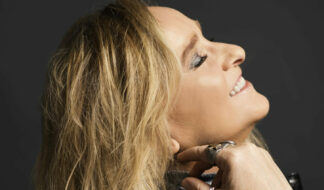Melissa Etheridge Says She Was Named ‘Worst Female Vocalist’ By Rolling Stone During Jann Wenner’s Reign
'They didn't even review it,' Etheridge said about her hit album 'Yes I Am'

Iconic lesbian singer-songwriter Melissa Etheridge may have two Grammys and an Academy Award, and even a star on the Hollywood Walk of Fame, but early in her career she says she was named “worst female vocalist” by Rolling Stone magazine. This, of course, was when the magazine was run by gay founder Jann Wenner, who recently exposed himself as a racist and misogynist during an insane interview with The New York Times.
On Wednesday, Etheridge posted on X, formerly known as Twitter, acknowledging that she felt “‘tortured’ by the lack of support” from the magazine.
Now, in a new interview with Pride Source, Etheridge is speaking out about her own experiences with Wenner’s cis male-focused version of Rolling Stone and elaborating on how, during her height of fame in the 1990s, she was treated as an openly lesbian woman.
“When I first started making music, I think they had a couple of small articles, and then right around my third album, I remember they used to do the ‘best and worst,’ and Rolling Stone voted me the 'worst female vocalist,'” Etheridge told Pride Source. “And I was like, ‘Ow.’”
At the time, Etheridge says she considered Rolling Stone to be the quintessential music magazine, that it had the “absolute last word in rock ’n’ roll.”
“Rolling Stone was a thing that you look to for rock ’n’ roll music to tell you what was happening, what was cool, what was good and what wasn't,” she said.
Upon the 1993 release of her seminal, six-times platinum certified album “Yes I Am,” which includes three of her biggest songs, including her Grammy-winning hit “Come to My Window," “they didn't even review it,” she said about the album.
“It was like they were specifically ignoring me, and it took for it to be massive before they did put me on the cover,” she continued. “They did an article about me, and then after that, it kind of was nothing.”
But Etheridge did eventually hear from Wenner, though only after she revealed to him that the sperm donor of her twins, Beckett and Bailey, with then-wife Julie Cypher was legendary folk singer-songwriter David Crosby. “One of the masters, I suppose,” Etheridge said.
“I look back and go, ‘Oh, how ridiculous,’ that I really believed that their not paying any attention to me meant that I wasn't good enough,” she told Pride Source. “That there was that belief somewhere inside me, even though I could say, ‘No, that's not true. It's not true.’ But it's there.”
As for Wenner’s comment about how he featured only men in his new book, “The Masters” — “insofar as the women, just none of them were as articulate enough on this intellectual level” — Etheridge wasn’t surprised that he felt that way given her own experiences. “I’m just surprised he said it out loud,” she said, “and had a chance to take it back and still was like, ‘No, no. This is how I feel.’”
“To say that Joni Mitchell isn't intellectual enough, it's just absurd. I'm intimidated by her. It's like, no,” she added.
Etheridge has a new book called “Talking to My Angels,” and it’s surely a more intellectually stimulating read over Wenner’s female-free ode to the patriarchy.










